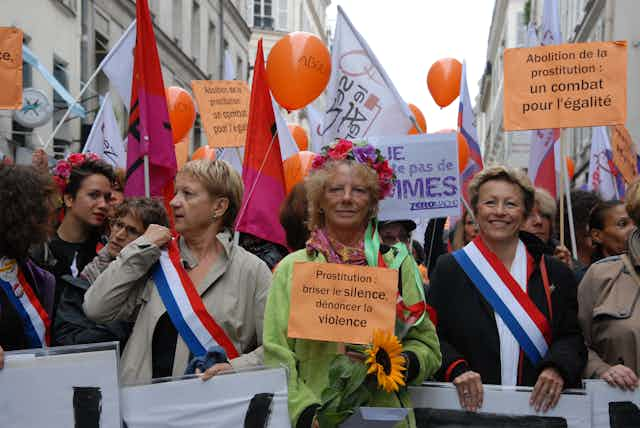This week France became the latest in a growing list of countries to decriminalise sex workers while banning the purchase of sex.
The French legislation is based on what has become known as the Nordic Model, a form of decriminalisation that treats prostitution as a cause and effect of gender inequality and a site of violence against women.
The Nordic Model shrinks the market for prostitution by targeting demand: making the activities of sex buyers illegal while removing any punitive measures against prostituted persons. It has been effective in Sweden, and has since been adopted in Norway, Iceland, Canada and Northern Ireland.

In places like Victoria, a state with one of the world’s oldest legalised systems of brothel prostitution, the sex industry has a lot to lose from the success of the Nordic model.
This appears to be a key factor in recent online protests centred around the World’s Oldest Oppression Conference being held at Melbourne’s RMIT University this weekend (April 9 and 10).
The conference, organised by Sister Survivor, a collective of sex trade survivors, includes a planned address from a well-known author and activist, Rachel Moran, who co-founded SPACE International: a survivor-led, non-governmental organisation that advocates for the Nordic Model.
It will include the launch of a new book Prostitution Narratives, a collection of survivor testimonies edited by Dr Caroline Norma and Melinda Tankard Reist. Sex trade survivors will speak at the conference and survivors who wish to attend can apply for free admittance.
The blog of one sex worker activist, a Media Liaison for the Vixen Collective (which dubs itself Victoria’s “peer only sex worker organization”), calls the conference an “attempt to silence our voices”.
“Thinking of joining the online campaign? (against the RMIT conference)” asks this blog. “Do you have an anonymous Twitter/Facebook/Email account? Please consider your safety/anonymity in your protest activities.”
It goes onto suggest that protestors “write to RMIT to express concerns about the Conference to the University Chancellor”; tweet directly to RMIT using the hashtag #RMIT2016 and take action on RMIT’s Facebook Page. (The conference, incidentally, is not run by, or officially endorsed by, the University.)
The use of such strategies will be familiar to any academic or commentator who has publicly criticised the sex industry. The same old myths about prostitution, trafficking and the Nordic Model are recycled, as are the online tactics used to bully, intimidate, and deny people a platform to speak.
Also familiar is the hyperbole of claims on social media. For instance, the existence of a conference critical of the sex industry is said to be discriminatory because “the disabled use sex workers”. Others claim that simply holding an event like this will increase “stigma and harm” against “sex workers”.
In these arguments, it is important to keep in mind that prostitution is not simply a contract between individuals but a lucrative, and exploitative, industry that is able to mobilise to protect its interests.
As the French Socialist Party MP Catherine Coutelle noted in support of the new legislation in France: “the prostitution market, which enriches only the exploiters, is the extreme form of capitalism”.
According to reports from IBISWorld, the legal “brothel keeping and sex worker services” sector in Australia is profitable and growing.
The Scarlet Alliance receives government funding. And the sex industry lobby is so normalised that it even has a political party to represent its interests in parliament.
It seems this “extreme form of capitalism” is firmly entrenched in Australia too.
This article was written with input from Dr Helen Pringle, co-convener of the Nordic Model Information Network.

